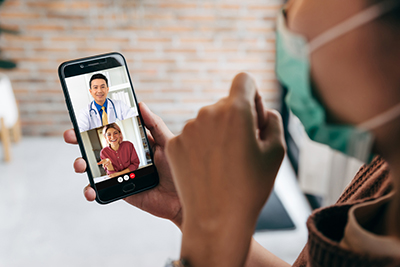Disabled patients and those with mobility issues sometimes struggle to attend in-person appointments. While video consultations can be a good alternative, it’s important any interpreting needed is carried out via the same medium.
 Unexpected travel delays are part and parcel of living in the UK, especially in the winter months when weather conditions shut roads, trainlines and airports. For many people, however, transport to appointments is a year-round challenge.
Unexpected travel delays are part and parcel of living in the UK, especially in the winter months when weather conditions shut roads, trainlines and airports. For many people, however, transport to appointments is a year-round challenge.
A wide-ranging study of 30,000 people carried out in 2019 by independent healthcare advocacy organisation Healthwatch found that travel was a key issue for those using the NHS, with 90% of respondents putting high importance on having convenient ways of getting to and from appointments.
A November 2024 update from Healthwatch suggested many people still struggle with transport to appointments. It highlighted that disabled people were especially disadvantaged by non-emergency patient transport being available only for hospital appointments and not GP or dentist visits.
To compound the problem, news reports suggest that in some regions of the UK, patient transport systems are overwhelmed and difficult to access even for hospital appointments.
This all increases the risk of missed appointments, which in turn prevents those with mobility issues from receiving proper care.
 Middle ground
Middle ground
While clearly the optimum situation is one where everyone can attend scheduled health appointments in person, if this isn’t possible, a much better option than missing the appointment is for it to take place virtually.
One of the few silver linings to come out of the pandemic was the realisation that many meetings could be conducted by video call, and this concept also filtered through to health settings.
Because many health services are now set up for video consultations, if it becomes clear transport issues will prevent a patient attending, often the consultation can still go ahead virtually.
An added complication arises, however, if the patient has communication or language needs that require an interpreter. Historically, language services providers, including Dals, offered face-to-face and telephone interpreting, but video was used rarely.
Prior to COVID, video interpreting made up just 1% of our company’s 15,000 transactions per day, but this has now risen to 10%.
However, we expect this to rise much further as the NHS looks to shift some hospital care to a digital first approach and now that we’ve added a video on-demand option. Previously, our video interpreting service was for pre-booked appointments only, but we recognised the huge potential of on-demand video interpreting for those needing urgent and emergency care.
In healthcare settings, there are clearly circumstances where a face-to-face interpreter is vital – for example, a terminal diagnosis.
 There are also circumstances where a telephone interpreter is the best option for both the patient and clinician – think delivering blood test results.
There are also circumstances where a telephone interpreter is the best option for both the patient and clinician – think delivering blood test results.
But in a scenario where a patient is unexpectedly unable to attend a physical appointment, being able to access an on-demand video interpreter is vital.
A disabled patient will receive better treatment from a clinician who can see the issues the patient is facing and video aids interpreters by providing visual as well as spoken cues.
Indeed, a study released in November by researchers at the University of Surrey found that interpreters viewed telephone interpreting as challenging in medical settings where visual cues were important. Respondents found video interpreting more effective and appropriate in situations where non-verbal cues were essential.
For those with disabilities or mobility issues, video interpreters help ensure they receive the same quality of care as those who don’t. With these now available on-demand, unexpected travel delays will hopefully present fewer barriers for such patients than in the past.
T 0161 928 2533
healthcare@dals.co.uk
www.dals.co.uk

